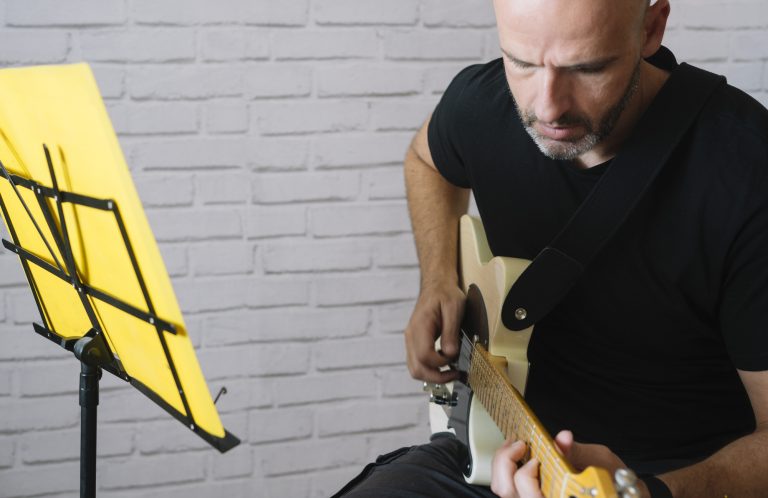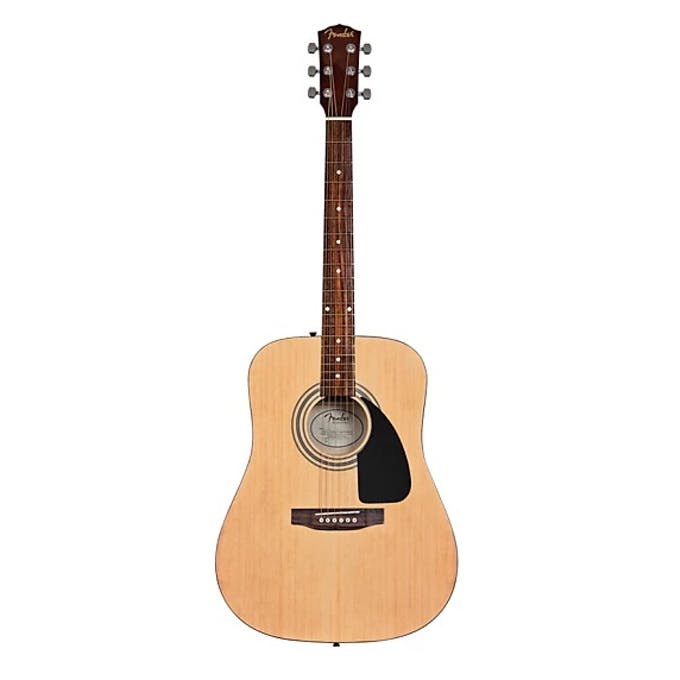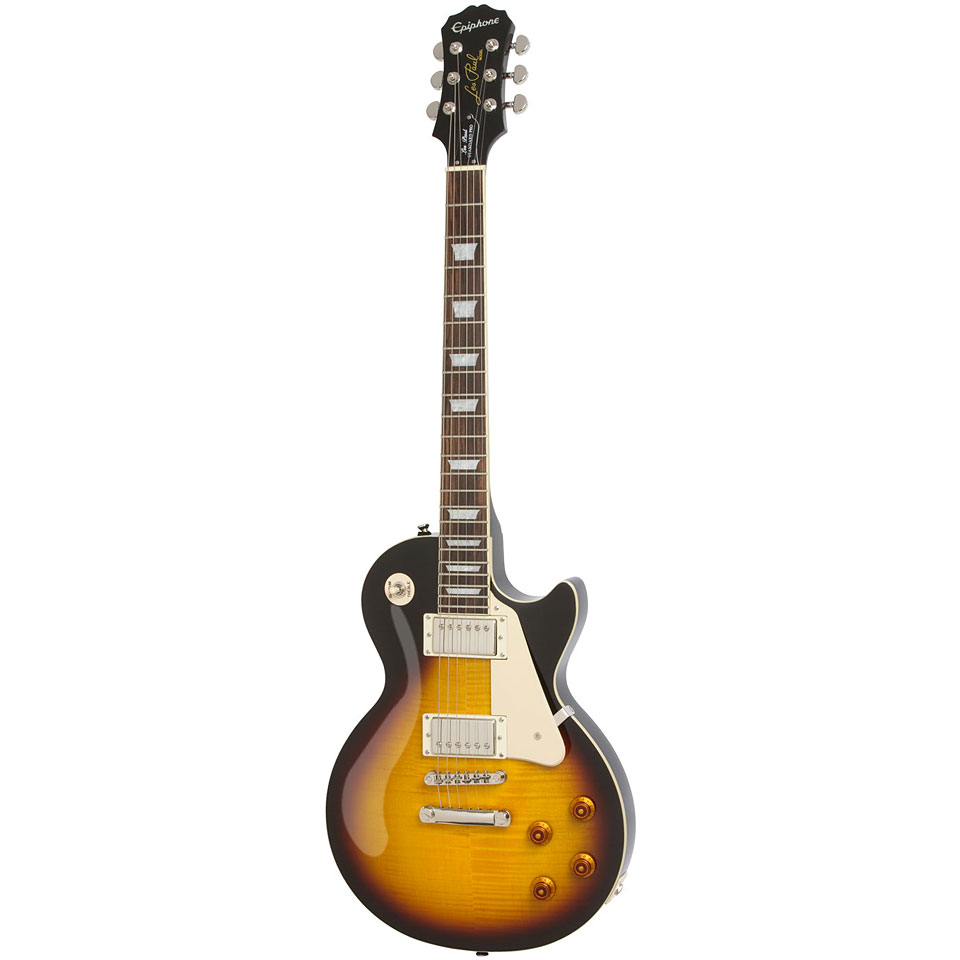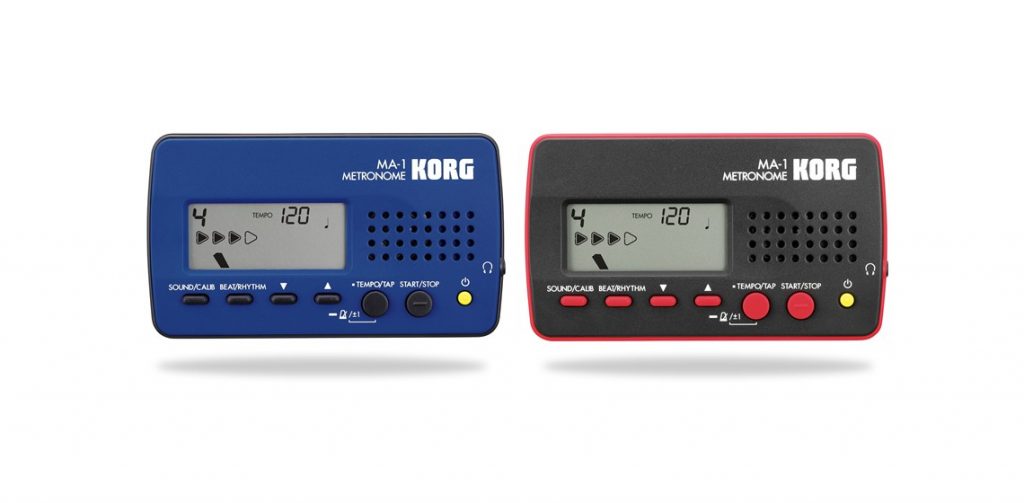7 Things Every Beginner NEEDS to Learn Guitar at Home
- Paul Andrews

Facebook
Twitter
Pinterest
Email
With the abundance of online courses and wealth of information on YouTube, more people than ever are learning to play the guitar at home on their own, without the need to see a teacher.
Unfortunately, with more people learning the guitar inevitably more people are quitting the guitar as well and a lot of the time it is because they are not setup properly to learn at home.
In this article I will introduce what I see as the 7 most important things a beginner needs to succeed with learning the guitar at home and give you a few tips on the best ways to use them. So before you think about quitting guitar have a read as one of these tips might just save your guitar playing life!
Tip 1: Practice Space
Having a dedicated practice space at home is super important and often overlooked by many beginner guitarists. Often when someone goes to practice they will setup wherever there is space, such as on the sofa or at a table. This might work out fine for the short term but is obviously not going to help you get the most from your practice sessions.
At the very least your practice space should be quiet and free from distractions, so not the corner of the room while your wife is watching TV! If you are lucky enough to have a spare room, study or another such space where you can setup a permanent practice space that would be ideal.
Clear your practice space from clutter and make your guitar the focus of the room. Decorate the space so it is inviting and try to make it a place you would like to spend time, hang up some pictures of your favourite guitar players to help inspire you. Make sure it is a nice environment to be in by checking lighting, heating and smells. Also make sure it is a suitable place to play your guitar and that the rooms acoustics are suitable for playing in.
Once all that is done it’s time for the most important part; choosing a chair. It took me quite a while before I found a good practice chair that was comfortable and had movable arms so I could position them out of the way when practicing, but move them back when needed.
So now you have created the perfect practice environment where you can forget about the day-to-day drudgery of life and instead get some precious ‘me’ time. Now all we’ve got to do is add a few more things.
Tip 2: Guitar
Now this one is pretty obvious but if you are a complete beginner just getting started on your guitar playing journey buying your first guitar can be very overwhelming.
The first question to answer is Acoustic or Electric Guitar?
To answer this have a think about what type of music you would ultimately like to play. If you are a fan of Ed Sheeran then acoustic is the way to go but if you like rocking out to AC/DC then electric would be your best bet.
The next thing to do is head down to your local music store and pick up a beginner guitar package or hop online and order one. As long as the guitar feels nice to hold and keeps its tuning it will be fine to start with.
Expect a good acoustic guitar to set you back around $150, something like the Fender FA-115 would be ideal. In regards to an electric guitar these will be more expensive and you need to also buy an amp, so expect to play around $250, something like the Epiphone Les Paul Electric Guitar player pack would be ideal.


Tip 3: Picks
It is important to have a stash of picks in your practice space ready to go, as there is nothing worse then sitting down to practice and realising you don’t have a pick and then having to go through the pockets of every pair of trousers you own and search through every drawer in the house to find one.
It is best to have a few different size picks to try and see what you like best, the thinner the pick the better it is for strumming, the thicker it is the better it is for picking. Aim to get a medium pick around 0.80 in size as this will give you the best of both worlds, a bit of bend so it moves through the strings when strumming but also it will be ridged enough to help give you accuracy when picking.
Buy a handful of different size picks from your local music store or eBay and see which one you get on with the best.
Tip 4: Guitar Tuner
It is important to make sure that your Guitar is in tune every time you sit down to practice as there is nothing worse than not knowing if it is you or the guitar that sounds off.
There are a few ways you could tune your guitar but the most common are using an app or using a standalone tuner. Fender Tune is the app I recommend to students because it is free and seems pretty accurate. In regards to a stand-alone tuner you will want a clip on one such as a Snark.
In the video below I walk you through using both methods of tuning.
Tip 5: Metronome
Many beginner guitarists have a love hate relationship with their metronome, OK so it is more hate than love but a metronome should be your best friend in your practice sessions. Think of the metronome as a simplified drummer, if you cannot stay in time with a metronome you have no hope of staying in time when playing along with a song.
When it comes to getting a metronome there are loads of great apps such as Pro Metronome, I also like Super metronome which is more of a drum machine than a metronome but because of this it feels like you are jamming with a drummer rather than jamming with the beep of a metronome.
If you would prefer to leave the electronics out of your practice room than check out the Korg MA1, I still have it’s predecessor the Korg MA30 which has lasted me years so I can definitely recommend Korg metronomes.

Tip 6: Music Stand
A music stand is essential to hold your music books (and/or iPad so you can watch Beginner Guitar Academy videos) and also a place to keep you picks, tuner and other essentials you need for a productive practice session.
When it comes to buying a music stand stay away from the cheap folding music stands. They are small, clumsily and I used to always knock it over, sending my music book flying in the process. Instead invest in a good quality orchestral music stand. These are more heavy duty, sturdy and bigger, so will be able to hold your accessories.
They are only typically a little bit more expensive than their wobbly counterparts but will definitely make practice times less stressful and more productive.
Tip 7: Instruction
Now your practice space is set up and you have everything you need the last thing is to make sure you have quality instruction to help you make progress and reach your goals.
There are lots of free options online including places like YouTube, but if you are serious about learning the guitar and want to develop a serious hobby then Beginner Guitar Academy is for you. We have a structured learning path taking you from complete beginner to advanced, centred around the seven essential guitar skills.
Our library of quick tips, songs and riffs will help you get better each and every day. This coupled with access to a community of beginner guitar players, teacher support and monthly live Q&A sessions, you get the best platform for beginner guitar players to improve.
Check out this page for more info and I can’t wait to see you in the Academy.
Thanks for reading and please let me know in the comments section below what you have in your practice space that helps you get the most from your practice sessions.
Facebook
Twitter
Pinterest
Email
